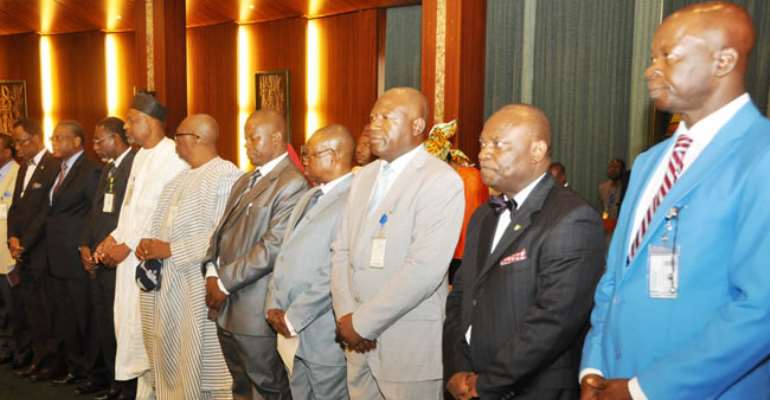Small Arms, Light Weapons C'ttee Not A Task Force, Says Jonathan

SAN FRANCISCO, April 24, (THEWILL) - President Goodluck Jonathan said on Wednesday that the newly-inaugurated Committee on Small Arms and Light Weapons is not a Task Force empowered to make rules and ensure compliance with them .
Describing it as a standing committee expected to work closely with existing anti-armament bodies to stem the tide of violence in the country and across the continent, Jonathan said the committee is simply “meant to provide government with necessary advice to mitigate the proliferation of small arms and light weapons.”
According to the President, “We said so because there are departments of government responsible for this.
But for these departments of governments to succeed, they must be supported with proper advice and international linkages.”
Members of the committee include Amb. Martin I. Uhomoibhi, Amb. T. Dan Hart, Amb. Ghali Umar, Amb. B. G. Wakil and Mr. Opelusi Olureti.
Others are representatives of the Ministry of Interior, the National Security Adviser (NSA), Directors-General of the State Security Service (SSS) and the National Intelligence Agency (NIA) as well as that of the Federal Ministry of Justice.
The remaining are representatives of the Ministry of Defence, the Nigeria Police Force, the Nigerian Customs Service, the Defence Intelligence Agency (DIA) and the Office of the Secretary to the Government of the Federation (OSGF).
The committee’s secretary is the Director of International Organisations Department in the Ministry of Foreign Affairs.
Speaking while inaugurating the committee in Abuja, the President said the committee will in no way jeopardise the existence and work of government agencies whose statutory duty is to check and ensure that such armament are kept out of the borders of the country.
The President, who did not give a time frame within which the committee will conclude its job , listed its terms of reference to include: The establishment of links and cooperation with similar institutions and other agencies that can help to build capacity; enhance information sharing and develop multi-level international support relationship as well as strengthen regional cooperation; while also focusing on putting forward policy situations as well as reviewing existing ones.
The committee is also expected to recommend implementation strategy to combat illicit trafficking of small arms and light weapons as well as measures to enhance border security, propose legislations and regulatory framework to strengthen control of the proliferation of small arms and light weapons in line with international standard.
“The establishment of this committee re-affirms the readiness and commitment of this administration to bring the state of violence and insecurity we have witnessed to an end,” the president said.
He said the effect of small arms and light weapons in Africa is worse than the effect of nuclear weapons and harmful drugs.
“The effect is as bad as production and distribution of (harmful) drugs, because the free use of small arms and light weapons are threatening. I believe that it is even more devastating than that of drugs.
“Without the free flow of small arms and light weapons leading the war against drug trafficking would have been easier for states. So, we use this opportunity to urge the United Nations to again come out with comprehensive approach to the control of small arms and light weapons,” he added.
Chairman of the Committee , Ambassador Emmanuel Imohe, in his response , said his committee members will work in line with coherent, legal and policy guidelines, including the ECOWAS Convention on Small Arms and Light Weapons, the AU Bamako Declaration as well as the UN Programme for Action on Small Arms and Light Weapons.
“I want to say that there indeed a connection in easy access to weapons and the problems of insecurity in the countries of Africa. And the reality today is that the ready deployment of these weapons is threatening non-state actors and also reinforcing criminal networks. As a result, small arms and light weapons now constitute perhaps the biggest threat to peace and security and by extension to development in so many countries in our sub-region.
“It is axiomatic to say that development can take place in an environment that is characterised by lack of security. Easy access to small arms and light weapons create insecurity which in turn impede growth and development in several countries within our neighbourhood,” he said.
